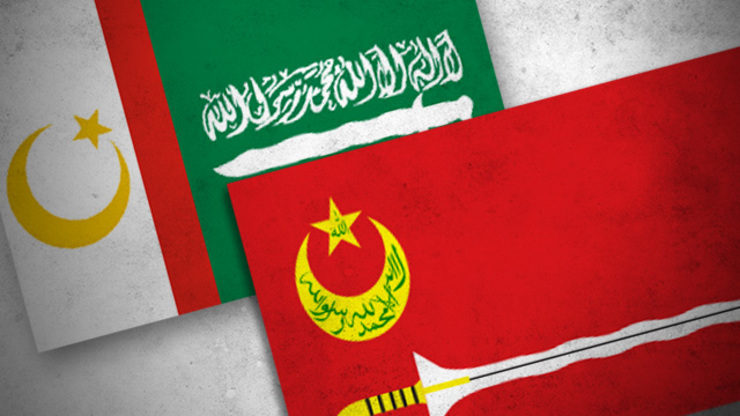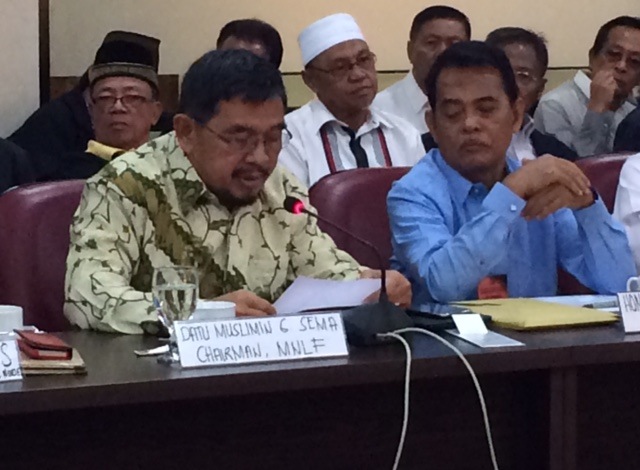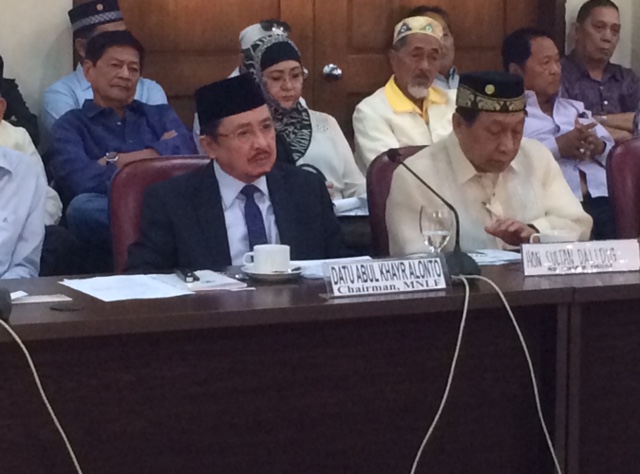The ad hoc committee on the Bangsamoro hears the concerns of Moro National Liberation Front in their 35th hearing on the proposed law

The House of Representatives opened the first day of session for 2015, Tuesday, January 20, with a committee hearing on the proposed law creating a new autonomous region in Mindanao.
It was the 35th public hearing conducted by the special committee created to tackle the proposed Bangsamoro Basic Law, and the 2nd to the last public hearing to be conducted before lawmakers hold a series of executive sessions to finalize the bill.
The hearings brought committee members not just to the current Autonomous Region in Muslim Mindanao but also other provinces such as Davao and Zamboanga and even provinces outside Mindanao – from Cebu to as far as Ilocos Norte – in what Cagayan Representative and commitee chairman Rufus Rodriguez described as one of the most comprehensive set of hearings conducted in the history of the House of Representatives.
This shows the level of effort that Congress has undertaken to seek and build a national consensus on the bill that seeks to create a new region with more political and fiscal autonomy than the ARMM.
The Aquino government wants the law passed first quarter of the year so that a plebiscite is held and leaders of the new region could be elected before President Benigno Aquino III steps down in 2016. (READ: Bangsamoro law Aquino's 2015 priority)
Yet proceedings during the 2nd to the last public hearing on the measure do not indicate consensus. The same issues that were at the center of the 2013 siege of Zamboanga that threatened to derail the peace process continued to be raised.
Leaders of two factions of the Moro National Liberation Front (MNLF), and heads of traditional sultanates in Mindanao faced the House ad hoc committee on the Bangsamoro Basic Law on Tuesday, January 20.
Abul Khayr Alonto, who represents 35 of the 39 surviving members of the original MNLF central committee, reiterated his strong support for the Bangsamoro Basic Law.
But Muslimin Sema, former Cotabato City vice mayor, maintained his stance that he neither supports nor rejects the bill.
Two other factions – the "Misuari Breakway Group" led by MNLF founding chairman Nur Misuari and Habib Mujahab "Boghdadi" Hashim, chairman of another MNLF breakaway faction, the Islamic Command Council, were not present. Both factions are against the peace process.
Also absent from Tuesday's hearing was the Bangsamoro Islamic Freedom Fighters - a splinter group of the MILF who have reportedly pledged allegiance to the radical Islamic State of Iraq and Syria (ISIS).
Misuari is facing criminal charges over the Zamboanga siege that killed closed to 200 during the conflict. (READ: Zamboanga still under siege)
It was the MNLF, under Misuari's leadership, that led the Muslim rebellion in the 1970s. The MNLF signed the peace pact with the Ramos administration in 1996.
The Moro Islamic Liberation Front, which signed a peace agreement with the government that is now the basis for the proposed Bangsamoro Basic Law, separated from the MNLF in the 1970s at the height of tensions between government and rebel forces due to leadership differences.
The MNLF signed two peace accords with the government - the 1976 Tripoli Agreement and the 1996 Final Peace Agreement - years before the MILF signed a peace pact with the government in March 2014. (READ: The MILF, the MNLF and 2 peace agreements)
After signing the pact with the Ramos government, Misuari rose to power to become the governor of the ARMM.

VARYING OPINIONS. Fomer Cotabato City vice mayor and Moro National Liberation Front leader Muslimin Sema faces the ad hoc committee on the Bangsamoro Basic Law. Photo by Rappler
MNLF
position
Up to now, the
MNLF maintains that the government reneged on agreements made in the 1976 and
1996 peace accords.
"The last 3
years have been very difficult for the MNLF. The signing of the Framework
Agreement on the Bangsamoro in 2012, the Comprehensive Agreement on the
Bangsamoro in 2014 and the crafting of the proposed Bangsamoro Basic Law may
have been great and historic achievements but they caused discord as
well," Sema said.
"The current
contrast further enhanced the friction that divided the MNLF in 1976 whether or
not to pursue independence or autonomy. And after the MNLF accepted autonomy in
1976 and 1996, we are divided further and subjected to the more difficult
question whether or not to cling to the 1976 and 1996 agreements or go back to
the original demand," Sema said.
The discord was
dramatized during the siege of Zamboanga in 2013, carried out after Misuari
once again declared he is pursuing independence after feeling left out of the
current peace process.
What does
the MNLF want?
For Sema, the
Bangsamoro Basic Law should not repeal Republic Act No. 9054 but only amend it.
Sema said this
will allow current provinces under the ARMM to be automatically included in the
proposed Bangsamoro region.
"In its
current form, the proposed Bangsamoro Basic Law is a recipe for disintegration
of the current autonomous region unless our perspective on this matter is taken
with a grain of salt. Moreover, this will be the third plebiscite on the region
and the way the BBL is written, we are bound to lose what we have gained in the
last 4 decades of our people's struggle," Sema said.
Sema said one of
the key components that was left unimplemented in the 1976 Tripoli Agreement
was the guarantee that the plebiscite to establish an autonomous government
should be conducted in 13 provinces and 9 cities in Mindanao and Palawan .
Sema wants
Congress to include this provision in the Bangsamoro Basic Law.
The government,
meanwhile, is of the position that the MNLF's aspiration to increase the ARMM's
territory is already embodied in the bill. In an ambush interview, Rodriguez
said he shares the same view.
Under the
proposed law, local government units outside the core territory – upon a
resolution or a petition of 10% of voters – may ask for their inclusion in the
plebiscite.

PRO-BANGSAMORO. Abul Khayr Alonto, who represents 35 out of the 39 surviving members of the original Moro National Liberation Front central committee, supports the proposed Bangsamoro Basic Law. Photo by Rappler
Alonto, who
signed a communique with MILF chairman Murad Ebrahim expressing his support for
the Bangsamoro, has the same position.
He said the
Bangsamoro bill should "enhance" rather than abolish the ARMM so it
may build on past agreements.
Alonto is not
part of the Jeddah formula. He was elected as chairman of the 35 out of 39
surviving members of the MNLF central committee just before the Comprehensive
Agreement on the Bangsamoro was signed.
Again, the same
question that have been raised many times in the past is raised by Sema:
"Where is the MNLF in all these considering it is the MNLF who negotiated
for our people the principles of autonomy laid down in the 1976 Tripoli
Agreement?"
Sema said there
are "insinuations" from the government to make the MNLF part of the
transition body for the Bangsamoro but this has not been discussed with the
MILF through the OIC-sponsored Bangsamoro Coordination Forum.
Instead of
focusing on the transition, government peace panel chair Miriam Coronel-Ferrer
urged parties to focus on preparing for the election of the first set of
Bangsamoro officials in 2016.
Challenge
before Congress
During the
hearing, Muntinlupa Representative Rodolfo Biazon asked Congress: Is it
possible within the community of our Muslim brothers to have a convention of
sorts to reconcile the differing statements of interests?
MILF chairman
Mohagher Iqbal said the MILF and the MNLF have, in fact, moved to reconcile
their difference through an OIC-sponsored forum.
Sema, for his
part, threw the question back to legislators, who after all, had been to blame
for crafting a law back in the late 90s that fell short of what the 1996 peace
pact had promised.
"We have accepted
autonomy. It is in the Constitution. But why is it so difficult to deliver it?
And why is it now that it is our fault, the faults are thrown to us - that it's
because we are not united? No, we are united. We have accepted autonomy. But it
must be the kind of autonomy that is comprehensive, and provides just and
lasting solution," Sema said.
When members of
the ad hoc committee go into executive sessions from January 26 to 29 and
February 2 to 4, Sulu Representative Tupay Loong said this is one of the key
issues that should be resolved:
"This is the
main issue facing us now - how to integrate the gains of the 1976 Tripoli
Agreement, 1996 Final Peace Agreement into the BBL."
He added:
"The word "abolishing" must be looked into because if you
abolish the ARMM, it is tantamount to rejecting the gains of the 1976 and 1996
peace accords."
Constitutional
issues
But for the
chairman of the committee, the more pressing issue is ensuring that the bill is
constitutional. (READ: Two schools of thought on the
Bangsamoro bill)
"There is
support in general of the general structure of the bill. The main points of the
bill are political autonomy - that's the power-sharing, and then the fiscal
autonomy. All the rest are just trimmings," Rodriguez said.
"We would
like to say that, in general, there is vast support for the bill. So we are
looking at some provisions that may be in conflict with the Constitution. So it
will not affect too much the meat of the bill," he added.
The last public
hearing on the Bangsamoro bill in the House on Wednesday, January 21, will
feature constitutional experts as speakers.
Senator Miriam
Defensor Santiago will hold another round of hearings focusing on
constituitonal issues on January 26.
Senate President
Franklin Drilon said the Senate hopes to pass the law in plenary by March but
Speaker Feliciano Belmonte Jr said there is no deadline to pass the law.

No comments:
Post a Comment
Note: Only a member of this blog may post a comment.